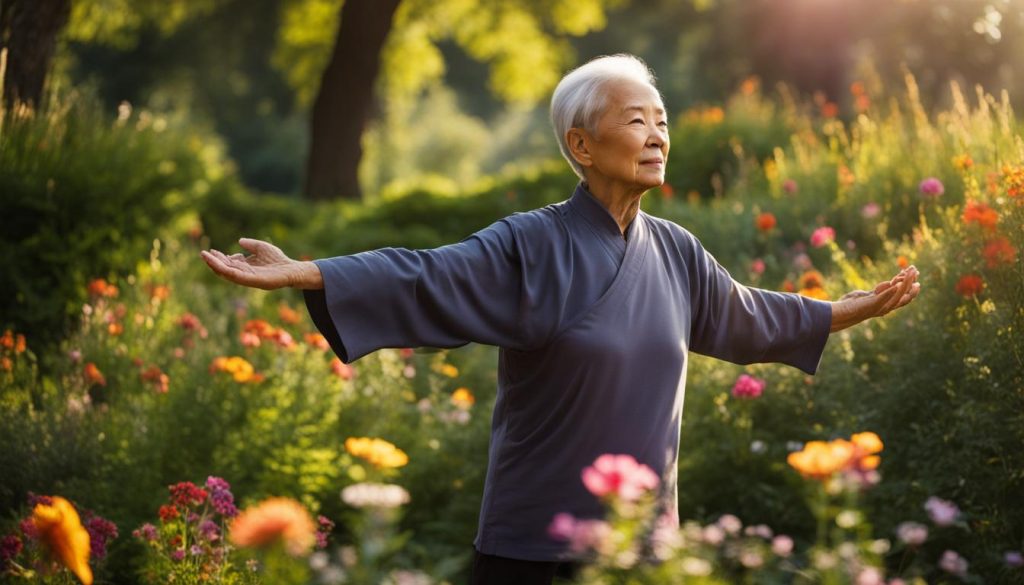Welcome to our article on the benefits of qigong for seniors. Qigong is an ancient practice rooted in traditional Chinese medicine and martial arts.
It offers a variety of benefits that can greatly enhance the well-being of older adults like you.
In the next sections, we will delve deeper into what qigong is, explore its specific benefits for seniors, discuss how long it takes for qigong to work, and provide a conclusion that ties everything together.
So, let’s get started on this journey to enhance your well-being through the power of qigong.

Qigong is a gentle and approachable exercise option that involves slow, deliberate movements and focused breathing techniques.
These techniques improve physical and energetic balance, which can have positive effects on your overall health and well-being.
Research studies have shown that qigong can be particularly beneficial for seniors recovering from various conditions such as Parkinson’s, cancer, and even COVID-19.
Some of the potential benefits of qigong for older adults include improved balance, coordination, stress reduction, and enhanced immune system function.
It can also help improve nervous system function, mood disorders, and lung function. However, it’s important to note that individual benefits may vary.
Before starting any new exercise program, it’s always advisable to consult with your healthcare provider to ensure it’s safe and appropriate for your specific health needs.
Content
What is Qigong?
Qigong is an ancient practice that focuses on the channeling and movement of the body’s vital energy, also known as chi or qi.
Often compared to tai chi or yoga, qigong incorporates gentle movements and intentional breathing techniques to enhance vitality and overall function. It offers a range of benefits for seniors, promoting both physical and mental well-being.
Unlike other exercises, qigong can be practiced either seated or standing, making it accessible for seniors who may have balance issues.
The practice emphasizes slower movements, allowing individuals to build strength, flexibility, and coordination at their own pace.
With its gentle approach, qigong is suitable for individuals of all fitness levels, including seniors who are new to exercise.
Before starting a qigong practice, it’s important for seniors, especially those with pre-existing health conditions, to consult with a healthcare provider. This ensures that qigong is a safe and appropriate addition to their exercise routine.
Seeking professional guidance can help seniors tailor their qigong practice to meet their specific needs and goals.
| Benefits of Qigong for Seniors | Qigong Exercises for Seniors |
|---|---|
|
|
Qigong offers a wide range of benefits for seniors, from improving balance and coordination to reducing stress and anxiety.
Here are some specific benefits seniors can experience through regular qigong practice:
- Improved Balance and Coordination: The slow and controlled movements in qigong help improve balance, coordination, and spatial awareness, reducing the risk of falls and injuries.
- Increased Energy Levels: By harmonizing and invigorating the body’s energy flow, qigong enhances vitality, leaving seniors feeling more energized and rejuvenated.
- Stress and Anxiety Reduction: Qigong’s focus on intentional breathing and mindful movements promotes relaxation, helping seniors manage stress and anxiety effectively.
- Enhanced Mental Focus and Clarity: Through qigong, seniors can cultivate a calm and focused state of mind, improving mental clarity, concentration, and overall cognitive function.
- Promotes Relaxation and Better Sleep: Qigong’s meditative aspects and deep breathing techniques can promote relaxation, leading to improved sleep quality and better overall well-being.
Qigong exercises for seniors can vary, but there are common practices that form the foundation of qigong.
These exercises can be adapted to each individual’s level of physical ability and can be performed either standing or seated. Here are some examples of qigong exercises for seniors:
- Deep Breathing Exercises: Diaphragmatic breathing techniques enhance relaxation, reduce stress, and increase overall lung capacity.
- Mindful Movements and Stretches: Slow, deliberate movements and gentle stretches promote flexibility, joint mobility, and improved circulation.
- Standing Meditation: Static standing postures help build inner strength and stability while promoting mindfulness and mental clarity.
- Self-Massage Techniques: Gentle self-massage techniques, such as acupressure, can help relieve tension, promote relaxation, and improve overall well-being.
- Visualization and Guided Imagery: Guided visualizations can enhance the mind-body connection, promoting relaxation and overall mental well-being.
The Benefits of Qigong for Seniors

Qigong offers numerous benefits for seniors. One of the most noticeable benefits is improved balance and coordination, which can help prevent falls and reduce the risk of injuries.
Qigong exercises for seniors focus on gentle movements and intentional breathing techniques, making it an ideal practice for promoting healthy aging and enhancing overall well-being.
One of the key advantages of qigong for senior citizens is its ability to provide stress relief and help manage anxiety and depression.
The slow and deliberate movements combined with focused breathing create a calming effect on the mind and body, promoting relaxation and emotional well-being.
Moreover, qigong has been shown to have positive effects on the nervous system, helping to improve neurological function in seniors.
By practicing qigong regularly, seniors can enhance their cognitive abilities, improve mental focus, and boost brain health.
The Benefits of Qigong for Elderly Wellness
Another significant benefit of qigong for seniors is its potential to improve lung function.
Research studies have indicated that qigong exercises can enhance respiratory capacity and strengthen the lungs, making it particularly beneficial for seniors recovering from respiratory illnesses such as COVID-19.
Additionally, ongoing research is exploring the potential benefits of qigong for chronic fatigue, cardiovascular diseases, immune system dysfunction, and even post-traumatic stress disorder (PTSD) in seniors.
While further studies are needed to establish conclusive evidence, initial findings suggest that qigong may have a positive impact on these health conditions.
Qigong for seniors vitality can be easily integrated into daily life, as it requires minimal time commitment.
Just ten minutes a day of practicing qigong exercises can offer significant benefits to seniors, improving their vitality, physical well-being, and overall quality of life.
However, it’s important to note that qigong is not a “magic bullet” and should be used as part of a comprehensive approach to health and well-being.
Seniors interested in starting a qigong practice should consult with their healthcare provider to ensure it is safe and appropriate for their individual needs.
How Long Does It Take for Qigong to Work?
The results of practicing qigong depend on your goals and reasons for starting the practice.
If you want to improve balance, agility, and bodily awareness, regular qigong practice can gradually yield positive results, much like other forms of physical exercise.
However, it’s important to note that qigong exercises may not provide a guaranteed solution for managing chronic pain or specific health conditions.
If you have existing health conditions or concerns, it’s always advisable to consult with a healthcare provider before incorporating qigong into your exercise routine, especially if you’re a senior.
Your healthcare provider can determine if qigong is a suitable addition to your wellness plan and guide you on how to incorporate it effectively.
Starting a qigong practice can be an excellent way for seniors to introduce exercise and stress relief into their daily lives. However, it’s essential to approach qigong with patience and consistency.
While qigong offers numerous benefits for seniors’ vitality and wellness, these benefits may take time to fully manifest.
Remember, qigong is just one piece of the puzzle when it comes to overall health and well-being.
It should be integrated with other lifestyle factors such as proper nutrition, adequate rest, and regular medical check-ups for a comprehensive approach to senior wellness.
The Benefits of Consistent Qigong Practice
A consistent qigong practice can have a wide range of benefits for seniors. Here are some of the potential positive outcomes you can experience:
- Improved balance and stability, reducing the risk of falls and injuries
- Enhanced mental clarity and focus
- Increased flexibility and joint mobility
- Reduced stress and anxiety
- Boosted immune system function
- Improved overall vitality and well-being
By dedicating time and effort to regular qigong practice, you can tap into its potential and reap the rewards for your physical and mental health.
To further understand the timeframe in which qigong can work its wonders, consider the individual nature of the practice.
Each person’s body and response to qigong may differ, so it’s crucial to approach your practice with an open mind and a willingness to explore what works best for you.
Does Qigong Work for Everyone?
While qigong is beneficial for many individuals, it’s important to note that its efficacy may vary depending on personal circumstances and health conditions.
Qigong may not be suitable for everyone, especially those with severe health conditions or physical limitations.
It’s always advisable to consult a healthcare provider before starting a qigong practice, particularly if you have specific health concerns or are taking medications.
Your healthcare provider can assess your individual needs and guide you on whether qigong is a safe and appropriate addition to your wellness routine.
Remember, qigong is a holistic practice that aligns mind, body, and spirit, and it can contribute to overall wellness.
However, it is essential to approach it with the right mindset and expectations, understanding that it may take time to see significant results.
Now that you have a better understanding of how long it may take for qigong to work and the importance of consistency and patience, you can embark on your qigong journey with confidence. With regular practice and a mindful approach, qigong can become a valuable tool for enhancing your vitality and wellness as a senior.
Conclusion
Qigong is a gentle and low-impact exercise practice that offers a multitude of benefits for seniors looking to enhance their overall well-being.
Through its slow, deliberate movements and focused breathing techniques, qigong can improve balance and coordination, reduce stress, boost immune function, and improve the quality of life for seniors.
In order to fully reap the benefits of qigong for seniors, it should be integrated with other important lifestyle factors such as proper nutrition, adequate rest, and regular medical check-ups.
Taking a holistic approach to health will help seniors maximize the positive impact of qigong on their physical and mental well-being.
If you’re a senior interested in starting a qigong practice, it’s always advisable to consult with your healthcare provider first. They can assess your individual needs and ensure that qigong is safe and appropriate for you.
With regular practice and patience, qigong can become a valuable tool for seniors to enhance their overall health and vitality, leading to a more active and fulfilling lifestyle.
